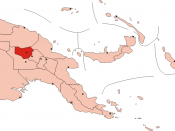New Guinea highlanders can go to war with each other to avenge ghosts or to exct revenge for the killing of one of their one. As we have to seen from other reports, or lessens we have discussed, people don't seen to comprehend the complex interrelationship among the various parts of their own social system.
The leaders of Papua New Guinea see intertribal fighting as a major social problem with severe economic consequences. Although fighting is not new to them, warfare seems to re-emerge in 1970s with a new set of causes. It is believed that the introduction of western goods may have resulted in changes in economic arrangements, marriage patterns, and, ultimately, warfare.
A little information about how warfare started and its causes:
After decades of pacification and relative peace, intergroup warfare reemerged in the Papua New Guinea highlands during the late 1960s and early 1970s, only a few years before national independence in 1975.
The outcomes of this warfare were death and destruction, martial law, and delay in highlands development schemes.
Possible explanations:
a. psychological insecurity surrounding political independence from Australian rule
b. disappointment at the slow speed of development
c. relaxation of government control which suppressed fighting since the pacification process began.
But none of these explanations has looked at changes in the structure or
infrastructure of highlands societies themselves which could account for behavioral changes in the management conflict.
Traditionally, groups maintained differential access to resources such as stone used for axes and salt. Ace heads and salt were produced in local areas and traded for valuables available elsewhere. The introduction of and distribution of items such as salt and steel aces reduced the necessity for trade, thereby altering the need for intertribal marriage as well as reducing extratribal contacts of a type which facilitated marriage...


